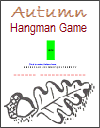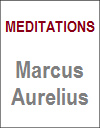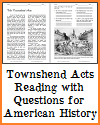2004 Presidential Election |
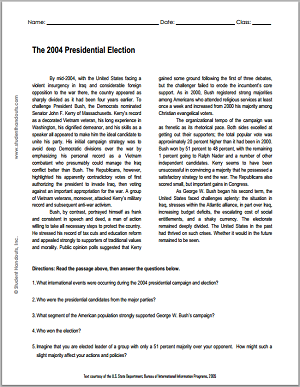 By mid-2004, with the United States facing a violent
insurgency in Iraq and considerable foreign opposition to the
war there, the country appeared as sharply divided as it had
been four years earlier. To challenge President Bush, the
Democrats nominated Senator John F. Kerry of Massachusetts.
Kerry's record as a decorated Vietnam veteran, his long
experience in Washington, his dignified demeanor, and his skills
as a speaker all appeared to make him the ideal candidate to
unite his party. His initial campaign strategy was to avoid deep
Democratic divisions over the war by emphasizing his personal
record as a Vietnam combatant who presumably could manage the
Iraq conflict better than Bush. The Republicans, however,
highlighted his apparently contradictory votes of first
authorizing the president to invade Iraq, then voting against an
important appropriation for the war. A group of Vietnam
veterans, moreover, attacked Kerry's military record and
subsequent anti-war activism. By mid-2004, with the United States facing a violent
insurgency in Iraq and considerable foreign opposition to the
war there, the country appeared as sharply divided as it had
been four years earlier. To challenge President Bush, the
Democrats nominated Senator John F. Kerry of Massachusetts.
Kerry's record as a decorated Vietnam veteran, his long
experience in Washington, his dignified demeanor, and his skills
as a speaker all appeared to make him the ideal candidate to
unite his party. His initial campaign strategy was to avoid deep
Democratic divisions over the war by emphasizing his personal
record as a Vietnam combatant who presumably could manage the
Iraq conflict better than Bush. The Republicans, however,
highlighted his apparently contradictory votes of first
authorizing the president to invade Iraq, then voting against an
important appropriation for the war. A group of Vietnam
veterans, moreover, attacked Kerry's military record and
subsequent anti-war activism.Bush, by contrast, portrayed himself as frank and consistent in speech and deed, a man of action willing to take all necessary steps to protect the country. He stressed his record of tax cuts and education reform and appealed strongly to supporters of traditional values and morality. Public opinion polls suggested that Kerry gained some ground following the first of three debates, but the challenger failed to erode the incumbent's core support. As in 2000, Bush registered strong majorities among Americans who attended religious services at least once a week and increased from 2000 his majority among Christian evangelical voters. The organizational tempo of the campaign was as frenetic as its rhetorical pace. Both sides excelled at getting out their supporters; the total popular vote was approximately 20 percent higher than it had been in 2000. Bush won by 51 percent to 48 percent, with the remaining 1 percent going to Ralph Nader and a number of other independent candidates. Kerry seems to have been unsuccessful in convincing a majority that he possessed a satisfactory strategy to end the war. The Republicans also scored small, but important gains in Congress. As George W. Bush began his second term, the United States faced challenges aplenty: the situation in Iraq, stresses within the Atlantic alliance, in part over Iraq, increasing budget deficits, the escalating cost of social entitlements, and a shaky currency. The electorate remained deeply divided. The United States in the past had thrived on such crises. Whether it would in the future remained to be seen. |
Directions: Read the text above, then answer the
questions below. |
1. What international events were occurring
during the 2004 presidential campaign and election? 2. Who were the presidential candidates from the major parties? 3. What segment of the American population strongly supported George W. Bush’s campaign? 4. Who won the election? 5. Imagine that you are elected leader of a group with only a 51 percent majority over your opponent. How might such a slight majority affect your actions and policies? |
|
Click
here to print. |
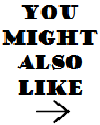 |
|---|
Text courtesy of the U.S. State Department,
Bureau of International Information Programs, 2005 |



